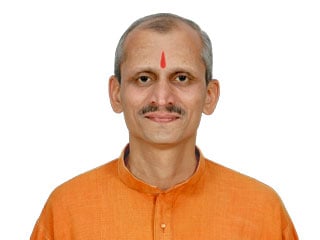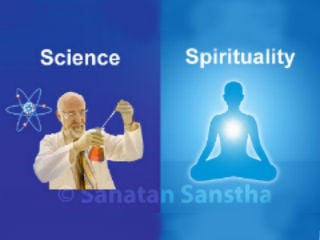Contents
- 1. Confusion about terminology
- 2. Difference in the literal and implied meaning
- 3. Different meanings of words used in the worldly and spiritual contexts
- 4. Extremely condensed form
- 5. Absence of worldly suggestions
- 6. Absence of explanation
- 7. Absence of comparative studies
- 8. Difference in terminology in Western psychology and Indian psychology (science of Spirituality)
- 9. Atheism
- 10. Meaningless rationalism
- 11. Social commitments
- 12. Charvak philosophy
Obstacles faced when studying Spirituality
1. Confusion about terminology
Several spiritual words have been used with different connotations in various holy texts. For instance Jagadguru Shri Shankaracharya has said that the antahkaran comprises of four parts (antahkaranchatushtay) namely the mind, subconscious mind, intellect and ego. According to another school of thought the antahkaran consists of three components (antahkaranam trividham) namely the mind, intellect and ego. The word ‘soul (atma)’ is referred to as Brahman (God principle) in some places and as the embodied soul doing spiritual practice (jivatma), the vital energy sheath or mental body sheath in other places. Due to this confusion in terminology often it becomes rather difficult and at times impossible to understand the subject.
2. Difference in the literal and implied meaning
In Spirituality, an attempt is made to express verbally that which is beyond words. Consequently, there is a difference in the literal and implied meaning. That is why as the spiritual emotion of a seeker rises according to his spiritual level, he comprehends the same point differently. In the worldly sense the literal meaning, for example 1 + 1 = 2, never changes. In Spirituality however, it does. To cite an example, it is said that 1 (Guru) + 1 (disciple) = 1 (Guru), because the disciple merges into the Guru.
The following examples shall illustrate how understanding only the literal meaning can lead to confusion.
- A. ‘How can one carry out worldly activities presuming that The Lord exists everywhere?
What a question! One will realise the presence of The Lord in everyone only after attaining spiritual knowledge. One should not make an attempt to realise His presence in everything simply out of emotion, as then one will have to pay obeisance even to the toilet basin! If one wishes to experience The Lord’s presence everywhere then one has to forget oneself otherwise it will lead to confusion.
- B. What is equality towards all?
One should consider all creation as equal in as much as being a form of Brahman (God) but not in their gross forms. The Gita says, the enlightened view a scholar, a priest (Brahman), the progeny of an intercaste marriage (chandal), a cow, an elephant and a dog with equality. Here, equality refers to the God principle. If one does not accept this then one will have to marry off one’s daughter to a dog and will have to say that one’s father was a donkey! Hence as long as one carries out worldly activities, one is expected to harbour an attitude of distinction between objects.’
- C. The implied meaning of the Guru’s ‘shaving off a disciple’s head’ or ‘flogging a disciple’ is ‘destroying impressions (sanskars) of past births in the disciple’s mind’.
- D. Once Samarth Ramdasswami said to Manikprabhu, “Why are you keeping those women of low morality (randa) with you?” He immediately left them. [Randa refers to ruddhi–siddhi (supernatural powers).]
- E. ढोल, गंवार, सुद्र, पशु, नारी । ये सब ताडन के अधिकारी ।
– रामचरितमानस, किष्किंधाकांड ५८A drum (ढोल), a fool (गंवार), a person of a low caste (सुद्र), an animal (पशु) and a woman (नारी) are all responsible for bringing about one’s downfall.
– Ramacharitamanas, Kishkindhakand 58Its implied meaning is as follows –
A ‘drum’ refers to the ear. The eardrum is stretched akin to the leather covering the surface of a drum. The ears hear external sounds but not the internal divine sound (anahat nad) coming from within.
A ‘fool’ refers to the intellect ignorant about Spirituality.
A ‘person of a low caste’ refers to the eyes. The eyes are the worst because they tempt man with desire.
An ‘animal’ refers to the breath. When an animal gets wild it exhales forcefully.
A ‘woman’ refers to the tongue which wags constantly.
If women fail to comprehend this implied meaning, then modern women will organise a protest rally!- F. The worldly meaning of shrimant (wealthy) is being a millionaire, billionaire, etc. while the spiritual meaning is one who possesses ‘Shri’ that is energy, beauty, virtues, etc.
3. Different meanings of words used in the worldly and spiritual contexts
As a result of this, it becomes difficult to comprehend spiritual literature. A few examples are given in the table below.
| Words | Worldly meaning | Spiritual meaning |
| 1. Ignorance | Absence of knowledge about worldly matters. |
Believing that ‘I am the body or the mind’ |
| 2. Knowing oneself |
Perceiving the physical and psychological qualities and defects in oneself. |
Realising that ‘I am Brahman’ |
| 3. Success | Acquiring respect, money, etc. |
Making spiritual progress. |
| 4. ‘A’ cheats ‘B’ |
‘B’ is cheated | ‘A’ is cheated |
4. Extremely condensed form
In the olden days since there were no facilities available for writing, all the information had to be memorised. As a result it was in a condensed form. For instance, Lord Patanjali has narrated the entire science of Yoga (Yogashastra) in 195 verses (sutras). The Guru would explain the meaning of this condensed form. However in the intervening period of a thousand years since there was a decline in the Guru-disciple tradition, it has become rather difficult to interpret the real (implied) meaning.
5. Absence of worldly suggestions
Worldly suggestions are absent in most of the holy texts. For example, Lord Patanjali simply mentions that ‘restraints and regulations (yam–niyam) should be observed’ but does not specify how they should be observed or what will make it feasible to follow them. (In ancient times the Guru would impart this information.)
6. Absence of explanation
Some books describe the path of spiritual progress, while others do not.
7. Absence of comparative studies
A book on a particular path of spiritual progress elaborates only that path and mostly mentions that ‘this path is the greatest’. One does not come across books which compare the various paths, discuss their advantages and disadvantages and limitations. This comparison is given in ‘Science of Spirituality : Chapter 40 – Comparison of the Various Paths of Yoga’. Besides every chapter on a path of Yoga gives the advantages and disadvantages and limitations of that particular path.
8. Difference in terminology in Western psychology and Indian psychology (science of Spirituality)
The perspective of westerners towards life –
There is no cure for birth and death. Save to enjoy the interval. – George Santayave
According to Western psychology everything is perceived with the mind or intellect; but according to the science of Spirituality the soul which is beyond the mind and intellect perceives (is the knower of) everything. Western psychologists have not yet reached this point. Westerners attempt to develop their personality while seekers try to destroy their personality (the very sense of individuality).
9. Atheism
Only 5% of the world’s population does not believe in God. This has been the situation for the past thousands of years. ‘Spirituality is not my cup of tea’ is what most atheists feel. This is because they believe that spiritual progress is something related to God. After reading this holy text they will realise that this perception of theirs is wrong. The reasons for this belief are as follows :
- A. Nearly 90% of the people who practise Spirituality in order to make spiritual progress follow the Path of Devotion (Bhaktimarg). Hence, some feel that to make spiritual progress one has to have devotion and since they do not believe in God they cannot develop devotion. Thus they conclude that ‘all this is not meant for us’. They do not realise that there are paths other than that of devotion, for spiritual upliftment. Even saints who followed the Sankhya Philosophy of Sage Kapil, worthy of being the masters of atheists, made spiritual progress and attained the Final Liberation (Moksha). Only 7 out of 195 verses in Lord Patanjali’s Yogasutras pertain to God. The remaining 188 verses do not make even a passing reference to God. Should these atheists follow them, then they too could definitely make spiritual progress and attain the Final Liberation (Moksha)!
- B. The second important reason for confusion among the atheists is that they have not understood the real meaning of the words ‘Final Liberation’ and ‘spiritual progress’. In brief, making spiritual progress means attainment of the experience of Bliss (Anand) which is beyond happiness and unhappiness. Experiencing that state continually is itself the Final Liberation. After comprehending this, which atheist will say ‘he does not want spiritual progress or the Final Liberation’?
- C. ‘Generally high salaried people are atheists. The more the salary the greater is the extent of atheism. The reason for this is the assurance of getting a fixed salary every month. The salary is more than the expenditure. So, they do not feel the need to believe in God. However those running a business are not atheists due to the unsurety of business and handling of large responsibilities. Hence they are constantly in need for some support and always believe in God. Only a rare salaried individual may not be an atheist. To summarise, atheism is rampant among rationalists and highly educated people. There are less rationalists among businessmen.’ (2)
- D. Due to atheism, some make ridiculous statements as illustrated below. The sister-in-law of a lady seeker told her, “Why are you following Baba (Bhaktaraj Maharaj)? Why don’t you join some course instead!”
- E. The definition of the word atheist is – ‘नास्तिको वेदनिंदक: ।’ meaning those criticising the Vedas and not accepting their concepts are atheists (nastik). The amusing part is that most atheists have never read the Vedas!
- F. ‘The atheists do not believe in God. Then one should question them as to whom one should fear to maintain a righteous code of conduct? The Upanishads say, “भयात् तपति सूर्य:” meaning the moon, the sun and the earth revolve fearing The Lord. We too behave righteously fearing Him alone.’
10. Meaningless rationalism
The functions of each of the five sense organs, five motor organs, mind, subconscious mind and intellect are different, for instance the mind perceives emotions while the tongue recognises taste. It is just impossible to measure through intellect such things, born of experience. Just as it is impossible for one to measure the proportion of acidity in a substance with the help of a weighing scale, so is this. Therefore it is incorrect to think that ‘only that which the intellect understands is true’. Spiritual experiences obtained during spiritual progress too are beyond the comprehension of the intellect. What then is the use of rational thinking her ? Just as the aura, frequencies, distressing and pleasant energy, etc. are things beyond the comprehension of the intellect, so is God.
Though the taste of sugar is beyond the comprehension of the intellect, yet to experience its taste one needs to obtain it by using one’s intellect. Similarly, one can enjoy the Bliss of Self-realisation which is beyond the intellect by practising Spirituality with the help of the intellect. The Upanishads were not written to convince the intellectual about spiritual knowledge on the basis of rational thinking but were written to show the curious seeker (jidnyasu) the path of spiritual experiences.
Some rationalists do not realise that it is wrong to write or speak on any subject without first studying it. A question from a book published by a women’s liberation organisation asks, “We worship the female deities along with the male deities when performing ritualistic worship (puja), then, why don’t we exclude female deities from ritualistic worship for the four days of their menstruation?” This has been written by one who is unaware of the meaning of a male and female deity. To put it briefly, since deities do not have physical bodies and since menstruation is a function of the physical body, the question itself is unscientific and ridiculous. However, the temple of Kamakshi, the famous female deity of the sorcerers (tantriks) in Asam, India is customarily kept closed for four days in a year because that active (jagrut) idol has been humanified. In the Vaishnav sect too, the temple is kept closed for reasons such as ‘now God is having His meal, He is sleeping’, etc.
Not just in Spirituality but also while undertaking the study of any other subject if one harbours the perspective that ‘I do not agree with it’, then one fails to understand the subject. However if one’s perspective is ‘I do not understand it’ then the one explaining the subject will elucidate it further. Rationalists should bear this in mind.
Differences between seekers who are curious about Spirituality (jidnyasu) and who are desirous of the Final Liberation (mumukshu) as well as the rationalists are given in the following table.
| Rationalists | Seekers | |
| 1. Motivation to realise God | Absent | Present |
| 2. Spiritual Practice | Absent | Present |
| 3. Proof | Actual proof | The word itself is the proof. |
| 4. Ego | High | Low |
The main factors responsible for the rationalist to have such a school of thought are given in the following table.
| Factors behind the philosophy |
Quantity % |
| 1. Destiny | 60 |
| 2. Guidance by distressing energies |
20 |
| 3. Vital energy | 20 |
| Total | 100 |
When the journey beyond the intellect starts, sheer insistence on using the intellect proves to be ill-founded. In short, it would only be right for rationalists to practise Spirituality themselves, for a few years before they venture to speak on it. Several people study the writings of saints like Tukaram Maharaj but do not follow what They did, that is do not practise Spirituality. They just study the fruit obtained but do not toil (practise Spirituality) from the time the seed is sown, till the fruit is borne.
Information acquired through the intellect is inferior to spiritual knowledge (dnyan) acquired through spiritual experience due to the following reasons.
- A. Information received through the intellect mostly has limitations of time and place. For instance, when one sees a piece of chalk the information that one gets about it through the intellect is with regard to the physical aspects like colour, shape, weight, etc. at that given point of time. On the contrary, with the help of spiritual knowledge from the subtle dimension, acquired through spiritual experience, one is able to perceive much more information related to its past as well as future, such as who has used it, from which shop it was purchased, where it was manufactured, what its fate will be, etc. Information obtained in science is intellectual. Refer point ‘Physical sciences and the science of Spirituality’.
- B. Saints have expressed the futility of mere verbal knowledge in the following words.
1. शब्दजालं महारण्यं चित्तभ्रमणकारणम् ।
– श्री शंकराचार्यकृत विवेकचूडामणि, ६२Meaning: The web of words is a great forest that causes the mind to wander. – Vivekchudamani, 62 authored by Shri Shankaracharya
2. ‘There is no need to study the scriptures or the Shrutis, to go on pilgrimages, study the yogas, perform sacrificial fires, observances or intense penance.
Do not harbour the fear of time, do not be afraid of evil people and never abandon Lord Shambhu (Shiva) whose remembrance liberates even the sinner.’ – Shridhar Swami (author of Shivalilamrut)
‘Righteousness (Dharma) is a rule or a principle unaffected by time, the Final Liberation (Moksha) means freedom in all aspects, the soul is the centre which endows an essence to the experiences, renunciation (nivrutti) is the attitude (pravrutti) to spread the spiritual knowledge which one has acquired to others. This attitude develops after one is enlightened spiritually. If one bears this gross yet mystery laden meaning in mind, then intellectual youth will certainly not turn away from Spirituality. On the contrary, they will get more and more attracted towards it.’
10.1 A challenge to rationalists
‘In the present times, the words Dharma i.e. Dharmacharan">Righteousness (Dharma), Spirituality, God principle (Brahman) and path of spiritual practice (yoga) have become tainted. On reading them, one feels as if one is standing before the main door of a tightly bolted hill fort in ruins. Today these words certainly do not convey the meaning of easily comprehensible doctrines. The real obstacle faced by the intellectual Indian youth are these. They are alarmed by the words Righteousness, soul, the Final Liberation and renunciation like the flashing of a red light. Though they harbour intense curiosity yet as these words have no longer remained meaningful, they are scorned at. How will one enjoy riding a bicycle when the tyres are punctured? Is there no remedy for this? These words have to be cleansed repeatedly, the cobwebs associated with them have to be cleared and they have to be renovated. Sometimes the composition may have to be restructured. There is no other alternative. We have to enlighten these four words for our own sake and with our own effort. The radiance within them has to be made to manifest itself and they should be given a facelift. To search for the basic form, meaning as given in the holy texts, the message these words convey, to express and experience the actual meaning of the words Dharma i.e. Dharmacharan">Righteousness (Dharma), soul (atma), the Final Liberation (Moksha) and renunciation (nivrutti) is the much needed rather the indispensable duty of the seekers who are curious about Spirituality (jidynasu) and desirous of the Final Liberation (mumukshu). When one experiences these words for one’s own spiritual progress, they begin to shine with their inner radiance. The moss and cobwebs gathered around them are cleared off automatically. Their presence to a lesser extent does not pose any obstacle. Moreover, where there is intense curiosity and an ardent desire to attain the Final Liberation there exists a natural energy to digest the tainted words.’
‘Just as weeds have to be cleared time and again, to prevent spoiling the growth of a crop; so also improper practices adopted in practising Dharma i.e. Dharmacharan">Righteousness have to be eliminated time and again.’
11. Social commitments
Spirituality also recognises the four debts, namely, the debt unto God, sages, ancestors and society. However, these are all considered from the spiritual point of view. The social obligations at the psychological level are not included in Spirituality. For instance, although ‘Each one derives merits according to one’s actions (Law of Karma)’ is a doctrine of Spirituality, terms such as equality and justice used at the psychological level do not enter the realm of Spirituality. Also one needs to be committed to the cause of the everlasting Truth, that is to the Guru in Spirituality. However, since society is constantly changing, social commitments also keep changing. Hence, they cannot be included in Spirituality.
12. Charvak philosophy
Charu (चारु) means melodious and vak (वाक्) means speech. Charvak (चार्वाक) thus means ‘melodious speech’. Hence people love this doctrine.
यावज्जीवेत् सुखं जीवेत् ऋणं कृत्वा घृतं पिबेत् ।
भस्मीभूतस्य देहस्य पुनरागमनं कुत: ।।Meaning: So long as one lives, one should live happily, feasting on clarified butter (ghee), even by incurring debt because once this body is reduced to ashes, the same will not be acquired again.
Who would not like to listen to such advice ? But very few are inclined towards thoughts which say that one must serve and sacrifice oneself for the spiritual cause.
Reference: ‘Spirituality’, published by Sanatan Sanstha.

 Unite the Jiva (embodied soul) with Shiva by performing Sadhana (Spiritual practice)
Unite the Jiva (embodied soul) with Shiva by performing Sadhana (Spiritual practice) Identify unpleasant incidents of the day that are obstacles in sadhana !
Identify unpleasant incidents of the day that are obstacles in sadhana ! Physical sciences and the science of Spirituality
Physical sciences and the science of Spirituality Importance of Spirituality
Importance of Spirituality Why are we born?
Why are we born? How to obtain Anand (Bliss) ?
How to obtain Anand (Bliss) ?